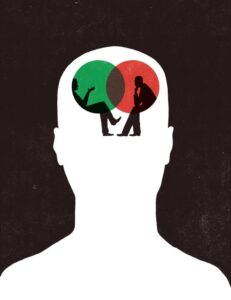Wittgenstein had raised this question somewhere: “When I am talking to myself, someone please tell me who is talking to whom”. The answer to this question is still unclear, and in this article, I do not intend to investigate the phenomenon of inner speech. But the role of this inner speech in futures studies is clear. Cognitive science researchers believe that people can think about possible futures in at least two modes of thought. The first is verbal (often in the form of inner speech) and the second is in the form of visual (often in the form of a mental images). The same researchers have come to the conclusion that each person relies more on inner speech than on mental imagery when thinking about very distant futures (long time intervals). Because it is very difficult to imagine a future that can have very different conditions from the present. Of course, mental imagery is involved in thinking about the distance future too, but the inner speech of the person plays the main role. Even when a person is trying to reach a conclusion about one or more possible futures from a series of propositions and with the help of reasoning (often causal), he relies on inner speech and simultaneous visualizations. A person’s inner speech plays a major role in determining what causes what effects.
Karl Weick, one of the pioneers of organizational psychology and the creator of sensemaking, went further and claimed that until one sees what is saying, one cannot understand what he/she knows. His famous phrase is: “How can I know what I think, until I see what I said”. Of course, this seeing and telling can be in the form of an inner speech or a conversation in a group. Anyway, this conversation, whether it is internal or group and social, has a very basic role in individual and organizational futures studies. Now the question is, on what basis are the content and the words, context, and topics chosen in this conversation, and what effects do they have on the futures studies of an individual or organization?

In one sentence, it should be said that choosing concepts, words, topics and putting them in a context (story/narrative/theory) about the future, is everything of a work of futures studies. If futures studies need a deep and correct understanding of changes and transformations, influencing changes or adapting to them, it must be able to create and develop concepts and theories that have the power to encompass and master those changes and transformations. In general, human adaptability depends on the capacity to create concepts and theories that provide correct and accurate information about the world of reality.
These concepts and theories are actually the main determinants of individual and organizational behaviors. For example, in the Ministry of Oil of Iran, in the past years, there were several offices and research institutes with title of “Extraction Increase”. That means, the strategic concept of the Ministry of Oil was to try to extract as much oil from the reservoirs as possible. In recent years, this concept has changed to “preservative extraction”. This concept of preservative extraction brought with it a series of other related concepts (such as protecting intergenerational interests, etc.) and finally changed the general behavior of the Ministry of Oil and the oil industry.

However, concepts, words, and language create and produce meanings in the mind, which ultimately shape the situational experience of that person or organization. That is, language is the creator of the reality that that person or organization sees. So, it is possible that by choosing the wrong concepts and words, wrong theories, false realities are formed in the mind and lead to wrong decisions and actions. Maturana, one of the researchers of biological sciences, believes that being human does not only mean that we can communicate with each other through language, but also means that we are immersed in language. In the eyes of cognitive science experts, every organization is a language system.

In this regard, Wittgenstein has another famous sentence that eloquently describes the role of language in individual and organizational life. He says that “the limits of my language means the limits of my world”.
We can expand Wittgenstein’s sentence in the field of futures studies in such a way that for a person or an organization, the possibility space they will see in front of them is limited by the language (interpretive) available to them. That is, as much as the concepts, theories and in general the language that people have, they will see and understand the current realities and finally identify the existing possibilities. The language that governs a person or system, determines the identity of that person or system and not only gives form, meaning and coherence to the realities before them, but also determines the limits and boundaries of what is possible for that person or organization.
Creating future concepts and theories is a tool that futurists have in order to prepare people and organizations for changes. Futures studies is actually the art of using language capabilities.

 فارسی
فارسی
